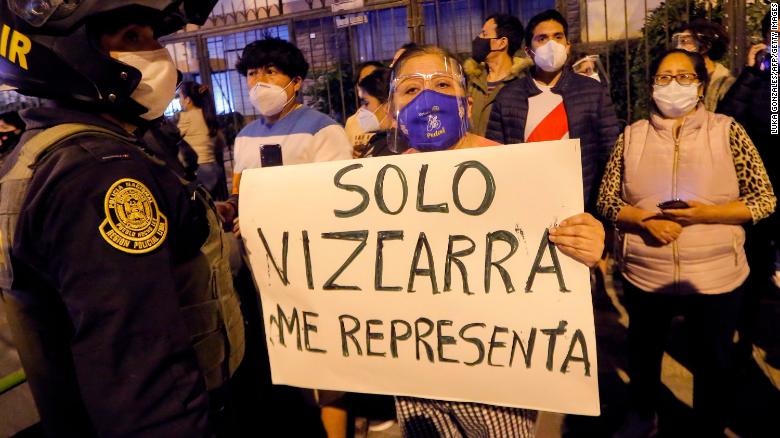Peru’s Congress ousted President Martín Vizcarra on Monday in an impeachment vote over corruption allegations, prompting immediate tensions in the Andean nation.Vizcarra said he would accept the Congress vote and would not take any legal action to counter it.
“Today I am leaving the presidential palace. Today I am going home,” Vizcarra said during a speech late on Monday, surrounded by his cabinet in the courtyard of the presidential residence in downtown Lima.
Head of Congress, Manuel Merino, an agronomist and businessman from the minority Popular Action, is expected to assume the presidency on Tuesday and will remain in office until the end of July 2021, when Vizcarra’s term was due to expire.
Merino called for calm after the vote and assured Peruvians that the April 11 presidential election would go on as planned.” It is already called for,” he said about the election in an interview with the local station América Televisión.
In the second effort by lawmakers to remove the centrist Vizcarra in a matter of months, the opposition-dominated Congress put forward 105 votes to oust him over accusations that as a governor he accepted bribes from companies that won public works contracts
.The 105 votes far exceeded the 87-vote threshold out of 130 needed to remove him from office. There were 19 votes against his ouster and four abstentions.Vizcarra has rejected the corruption allegations as “baseless” and “false.” He warned of “unpredictable consequences” earlier on Monday if lawmakers impeached him ahead of the April 11 election, in which he is not eligible to run.
Vizcarra’s removal from office plunges the world’s No. 2 copper producer into political turmoil as it looks to recover from an economic recession brought on by the coronavirus pandemic. A woman displays a banner reading ‘Only Vizcarra represents me’ in Spanish as former President Vizcarra arrives home in Lima on November 9.
A woman displays a banner reading ‘Only Vizcarra represents me’ in Spanish as former President Vizcarra arrives home in Lima on November 9.
Dozens of people gathered at Plaza San Martín in downtown Lima in support of Vizcarra after the news of his ouster as police officers kept a close eye on the crowd.
Video circulated on social media showing Congressman Ricardo Burga, who voted in favor of the impeachment motion, being punched in the face by a bystander as he spoke to television reporters.
Vizcarra, 57, lacked a party in the fragmented Congress, and had a tense relationship with lawmakers, with whom he frequently locked horns over his anti-graft agenda. He dissolved Congress last year after a long-running standoff, a move that prompted criticism by right-wing lawmakers.
Vizcarra survived a first ouster attempt in September in a separate impeachment trial over alleged links to a case of irregular government contracts with a little-known singer. Only 32 in the chamber voted in favor of his ouster in that vote.
In November, however, lawmakers voted to move forward with a new impeachment trial over accusations that Vizcarra accepted bribes from companies that won public works contracts when he was the governor of the southern region of Moquegua.
Vizcarra’s removal could usher in a period of political tensions in the months leading up to elections as Peru is already strained by economic instability and the impact of the pandemic, analysts said.
“Political turmoil related to the latest impeachment process and corruption allegations add to deep distrust of the political class ahead of upcoming elections,” international firm Eurasia said in a report earlier on Monday.
‘Coup in disguise’
Vizcarra’s government clashed with Merino in recent months over accusations that he tried to invoke the military in his request for Vizcarra’s removal. Merino denied any wrongdoing.
Analysts said Merino could push some populist measures in the months leading up to Peru’s elections.”[Merino] would probably maintain the existing economic policy framework but advance some populist measures as he tries to win public support,” Eurasia said.
Lawmakers sympathetic to Vizcarra rejected his ouster and warned that the decision would heighten instability in the Andean country.”This is a coup in disguise. We need calm, but also a lot of citizen surveillance,” George Forsyth, a mayor and one of the early front-runners for the 2021 election, said on Twitter.
Francisco Sagastegui, a lawmaker with the centrist Partido Morado, called the vote an “incorrect decision.”
“We think this is… a decision that adds much more uncertainty, creates problems, and will severely affect our citizens,” Sagastegui said.
Source: CNN


